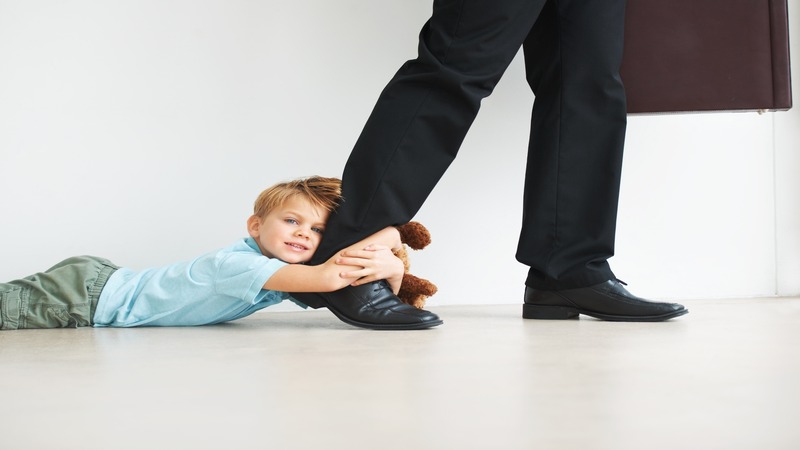
It is heartening to have your little one love you so much that they cannot think of spending even a moment away from you, however, it is not a very practical proposition. As their little hands cling to you, you may experience a big tantrum or a bucketful of tears to deal with. As a parent, dealing with separation anxiety in toddlers is a common experience. The toddler goes through intense emotional distress as manifested through incessant crying, clinginess, or tantrums.
Separation anxiety is a developmental hurdle and as such understanding its causes and coping strategies can help parents navigate this phase easily. Moreover, it is important to ensure a secure attachment that supports their long-term emotional well-being.
What is Separation Anxiety?
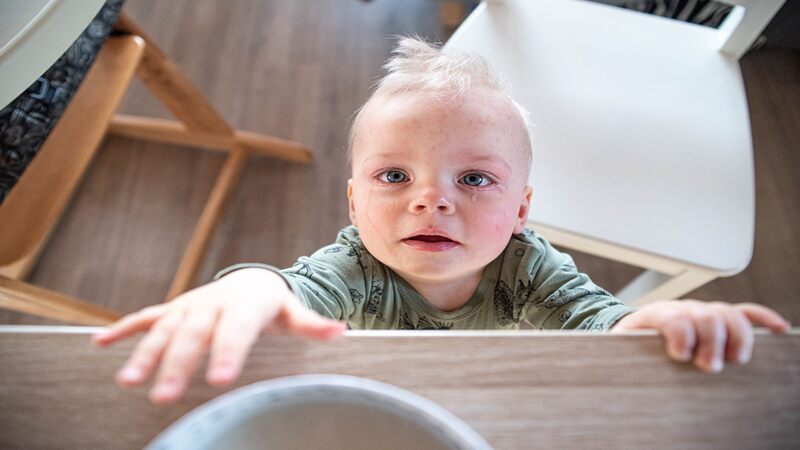
Separation anxiety is a psychological state of fear and mental discomfort observed in infants and toddlers. The condition is symbolized by excessive clinginess to the parent or caregiver, often leading to loud cries, or tantrums when separated from the parent even for a short while (1).
Separation anxiety operates when your toddler starts to realize that their world typically surrounds you and they are not safe elsewhere. Your little one is scared to face strangers and may scream, shout, or throw tantrums when left alone in a daycare or at home with other family members (2). This type of anxiety occurs in 4% to 10% of kids and is equally common in boys and girls (3).
What Causes Separation Anxiety in Toddlers?

For you, farewells become clingy and suffocating. Separation anxiety typically begins by 8 or 9 months and continues till 3 years, with minor variations (4). Separation anxiety is not something that springs to life in toddlerhood alone.
Around the time your little one is six or seven months, they develop a concept called object permanence. This means that “something exists even if one cannot see it”. So if a toy falls under their crib, they know it is there, although they cannot see it. Similarly, they know you are there even if they cannot see you. The toddler’s attitude would be like “If my mom is around, why can’t I see her NOW” (5).
The causes for separation anxiety in toddlers are many – ranging from attachment issues to genetics and even environmental stress. Some of the typical causes are as follows:
- Early life experiences such as parental separation or divorce can make toddlers insecure and fearful, causing separation anxiety (6)
- Toddlers who are too sensitive have poor emotional regulation and as such, respond with greater intensity of fear and discomfort (7)
- Sometimes, overprotective parenting can be the cause. The toddler never experiments with unknown people. Thus, they feel scared when left alone (8)
- Fear of rejection by parents or caregivers can lead to separation anxiety
- Chronic illness or hospitalization can trigger fear of being left alone
- A family history of anxiety disorders or a sibling having similar symptoms can cause separation anxiety (9)
- Toddlers fear being left alone as they are fragile and don’t know how to deal with unknown surroundings or people. Clinginess sets in as they want reassurance from parents (10)
Signs Your Toddler Has Separation Anxiety
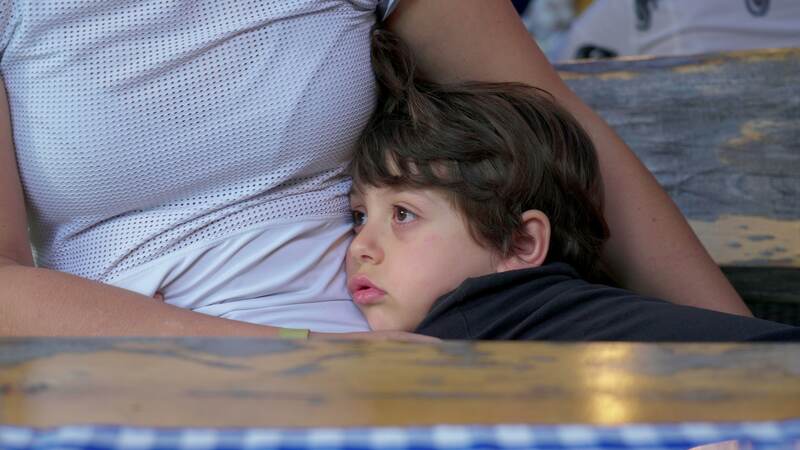
Toddlers who suffer from separation anxiety show signs of emotional distress when away from you or their beloved caregiver. They may cry, scream, or become excessively clingy to the point where parents feel stuck and helpless. Some signs that your toddler has separation anxiety are:
- Excessive worry about being away from the parent
- Crying or throwing tantrums off and on
- They refuse to be left alone and never want to be beside a stranger
- Physical signs such as stomach aches, headaches, or nausea occur at the thought of being left alone
- Becomes panicky when separation occurs unexpectedly
- Refuses to go to preschool or play area without the primary caregiver
What to do if Your Toddler Has Separation Anxiety?
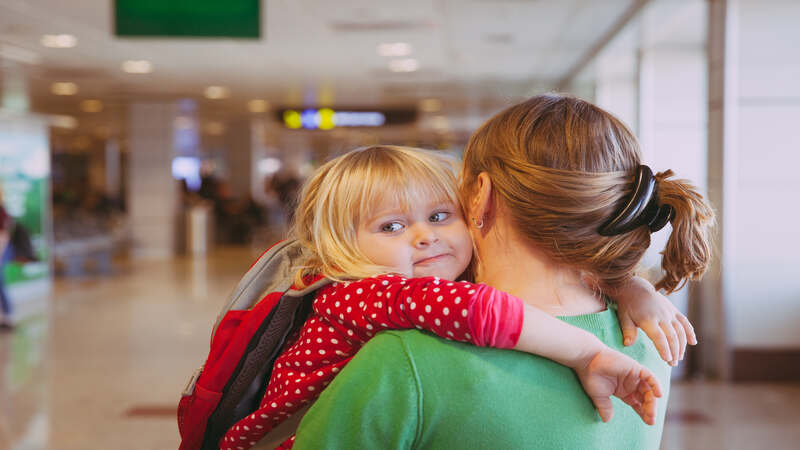
When separation anxiety is persistent and unrealistic, it needs to be treated (11). As parents, your immediate response would be either guilt or an attempt to pacify them. However, you can help them deal with separation anxiety in the following ways:
1. Do Not Sneak Away
Although it could be tempting to sneak away without letting your toddler know to avoid tantrums and tears, it is not a very good idea as it is known to increase separation anxiety. Remember that the tiny one does not have the concept of time yet? When you sneak away, your toddler thinks you have gone forever!
2. Practice Short Departures
Begin with short separations and gradually extend the time apart, allowing your toddler to adapt at their own pace. Short departures can prepare them to be used to being away from you (12).
3. Have a Good-bye Routine
Develop a good-bye routine just for both of you. It could be a high-five, a fist bump, a kiss, or a combination of these. This should be your “secret code” to behave when not together. Your way of telling the toddler to enjoy the time with a promise that you are going to meet them in a short while. Routines always instill security and calmness (13).
4. Be Calm And Confident
Many moms burst into tears when leaving their toddler in the preschool or daycare for the first time. This only makes matters worse. The moment you cry, you are sending out the vibe that the daycare is a place that is unsafe and you are sad to leave the tiny one. The toddler immediately feels “If mamma is crying, this place will suck”. Instead, be calm and show confidence that your toddler will do great when away.
5. Reward
While not burning a hole in your pocket, promise your toddler some rewards if they behave well when away from you. And more importantly, follow up on these promises. Rewarding a child for good behavior goes a long way ahead in motivating them to live fearlessly in life (14).
6. Let Them Know When You Will Meet Again
Although they do not understand time well, they would love to be reassured that you will come back for them. And let them know when you will be back. Assure, reassure, and keep on telling your toddler that you will be back soon.
How Long Does Separation Anxiety Last?
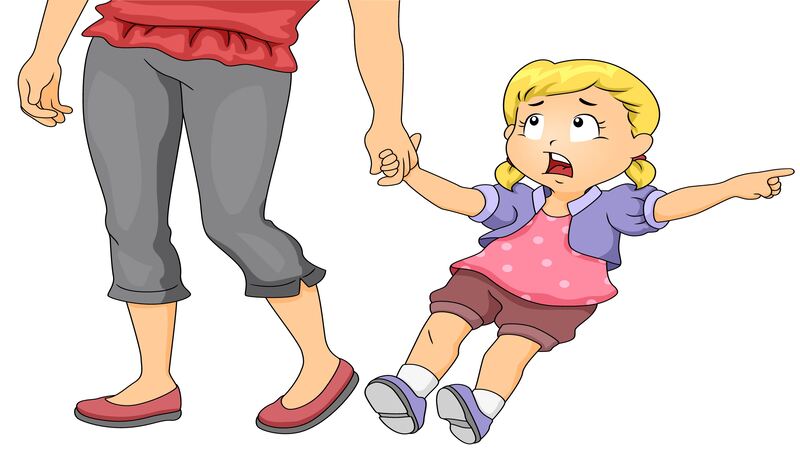
The duration of separation anxiety varies from one toddler to the other. In toddlers, fear of being left alone may begin by 8 months and continue till they start preschool years. At times, the temperament of the tiny one and their immediate surroundings also play a role. Most toddlers outgrow separation anxiety as they grow older and realize that their school or the playground is a safe place to be alone. However, a small number of them still suffer from anxiety in their adult years, if left untreated (15).
Is There Any Treatment For It?

Yes, separation anxiety can be treated through therapy and medications, if needed. Cognitive-behavioral therapy (CBT), helps toddlers develop coping strategies by letting them know their faulty thought patterns (16). For severe cases, medication may be prescribed. Additionally, support from family and consistent routines can ease symptoms, helping both children and adults manage and overcome separation anxiety.
When to Seek Help?

As discussed, separation anxiety goes away by itself. When the toddler continues to suffer from excessive fear and responds with crying, screaming, and is reluctant to leave you or a caregiver, then consulting a trained child counselor is advised. Moreover, if it lasts for weeks or months and no reassurance seems to work, seeking help from experts becomes imperative.
For most toddlers, separation anxiety disappears on its own. And for many others, it does not. It could be challenging when a toddler struggles to stay separated from their parents even for a short duration. However, by maintaining a positive approach, you can create a safe space for them to gather the courage to become more independent slowly and steadily.
FAQ’s
1. How do I Know if my Toddler Has Separation Anxiety?
If they cry excessively when you are away or throw a lot of tantrums when left alone with someone else. If they cling to you, have sleep issues, or show reluctance to leave you even for a short while, it’s likely to be separation anxiety.
2. At What Age Does Separation Anxiety Typically Peak?
Separation anxiety peaks from 9 months to 3 years, with mild variations in toddlers. When they become more aware of their surroundings and feel lonely and distressed without a caregiver they know, then separation fear sets in.
3. How to Handle Toddler Separation Anxiety at Bedtime?
For bedtime, you can establish a calming routine, and offer assurance that you are present till they’re asleep. Moreover, you can put a comforter or a soft pillow that is soothing and takes away your toddler’s feeling of being alone in the room. Gradually encourage them to sleep alone, while supporting their emotional needs.
4. What Not to Do With Separation Anxiety?
Avoid those lengthy goodbyes and sudden move-ons without informing them. You should never dismiss their sad feelings, instead, be kind and show your support. Moreover, avoid being angry or frustrated with them.
5. Can Mothers Get Separation Anxiety?
Yes, mothers can experience separation anxiety when they see their little ones feeling upset. They suffer from typical motherly guilt when apart from their toddlers. It’s normal for mothers to worry while away, but staying calm and positive benefits their toddler’s overall well-being.
References
- Feriante J, Torrico TJ, Bernstein B. Separation Anxiety Disorder. [Updated 2023 Feb 26]. In: StatPearls [Internet]. Treasure Island (FL): StatPearls Publishing; 2024 Jan. – https://www.ncbi.nlm.nih.gov/books/NBK560793/
- Solan, Ronnie. (2016). Stranger Anxiety: When Children Face Strangers. Mental Health in Family Medicine. 12. 10.25149/1756-8358.1202011. – https://www.researchgate.net/publication/318735666_Stranger_Anxiety_When_Children_Face_Strangers
- L.C. Wilson, A. Scarpa, in Reference Module in Neuroscience and Biobehavioral Psychology, 2017 – https://www.sciencedirect.com/topics/medicine-and-dentistry/separation-anxiety-disorder
- Online Medical Reviewer: L Renee Watson MSN RNMarianne Fraser MSN RNPaul Ballas MD, Date Last Reviewed: 3/1/2023, Nationwide Children’s Hospital – https://www.nationwidechildrens.org/conditions/health-library/separation-anxiety-disorder-in-children
- Karen Faulkner, Nurture Parenting, May 23, 2018 – https://nurtureparenting.com.au/blogs/free-advice/object-permanence-separation-anxiety?
- Lee CM, Bax KA. Children’s reactions to parental separation and divorce. Paediatr Child Health. 2000 May;5(4):217-8. doi: 10.1093/pch/5.4.217. PMID: 20177523; PMCID: PMC2817796. – https://www.ncbi.nlm.nih.gov/pmc/articles/PMC2817796/
- Dabkowska, Malgorzata & Araszkiewicz, Aleksander & Dabkowska-Mika, Agnieszka & Wiłkość-Dębczyńska, Monika. (2011). Separation Anxiety in Children and Adolescents. 10.5772/22672. – https://www.researchgate.net/publication/221916221_Separation_Anxiety_in_Children_and_Adolescents
- Clarke K, Cooper P, Creswell C. The parental overprotection scale: associations with child and parental anxiety. J Affect Disord. 2013 Nov;151(2):618-624. doi: 10.1016/j.jad.2013.07.007. Epub 2013 Jul 31. PMID: 23916305; PMCID: PMC3808745. – https://www.ncbi.nlm.nih.gov/pmc/articles/PMC3808745/
- Silove D, Manicavasagar V, O’Connell D, Morris-Yates A. Genetic factors in early separation anxiety: implications for the genesis of adult anxiety disorders. Acta Psychiatr Scand. 1995 Jul;92(1):17-24. doi: 10.1111/j.1600-0447.1995.tb09537.x. PMID: 7572243. – https://pubmed.ncbi.nlm.nih.gov/7572243/
- Dr. Tali Shenfield, Advanced Psychology Services, January 27, 2023 – https://www.psy-ed.com/wpblog/clinginess-in-children/
- Poopal T. (2021). Separation anxiety disorder among children and adolescents. International Journal of Indian Psychology, 9(1), 859-866. DIP:18.01.091/20210901, DOI:10.25215/0901.091 – https://ijip.in/articles/separation-anxiety-disorder-among-children-and-adolescents/
- UNICEF – https://www.unicef.org/jordan/stories/how-manage-your-childs-separation-anxiety
- Colleen Johnson, MD Pediatrician, Children’s Wisconsin – https://childrenswi.org/newshub/stories/easing-separation-anxiety
- Pepito, Genalen & Montalbo, Imelda. (2019). Separation Anxiety on Preschoolers’ Development. – https://www.researchgate.net/publication/330410506_Separation_Anxiety_on_Preschoolers’_Development
- Ehrenreich JT, Santucci LC, Weiner CL. SEPARATION ANXIETY DISORDER IN YOUTH: PHENOMENOLOGY, ASSESSMENT, AND TREATMENT. Psicol Conductual. 2008 Jan 1;16(3):389-412. doi: 10.1901/jaba.2008.16-389. PMID: 19966943; PMCID: PMC2788956. – https://www.ncbi.nlm.nih.gov/pmc/articles/PMC2788956/
- James AC, Reardon T, Soler A, James G, Creswell C. Cognitive behavioural therapy for anxiety disorders in children and adolescents. Cochrane Database Syst Rev. 2018 Oct 31;2018(10):CD013162. doi: 10.1002/14651858.CD013162. PMCID: PMC6517153. – https://www.ncbi.nlm.nih.gov/pmc/articles/PMC6517153/
